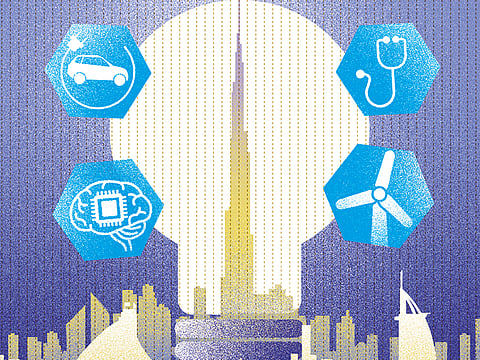How science and innovation will change Dubai
Here are the top five trends identified by the Dubai Science Park that look set to shape the sector in 2018

As 2017 has come to an end, many are keen to learn what 2018 holds.
Over the past 12 months, we have seen some incredible developments in the field of science around the world, influenced by advancements in the Internet of Things, robotics, artificial intelligence (AI), blockchain and edge computing, to name a few.
Dubai continues to be one of the fastest-developing and most innovative cities in the world. With its out-of-the-box approach, the 10X initiative, one of Dubai’s latest government initiatives, is on track to make Dubai the city that is 10 years ahead of other major metropolises. Furthermore, the stakeholders of the Dubai Industrial Strategy 2030 are hard at work to attract the most innovative manufacturers that will help increase productivity and efficiency of the local economy.
The science sector is particularly fast-paced due to its high dependency on innovation, research and development and technology. Here are the top five trends identified by Dubai Science Park that look set to shape the sector in 2018:
#5: Telehealth — Will your virtual doctor see you now?
Telehealth will continue to improve patient services across the board. 2018 will most likely be the year when virtual doctors become mainstream. The proliferation of online health portals and mobile health apps will enable people to access medical advice from home or from the office through their laptops, tablets or smartphones. As the technologies mature, patients will be able to connect with a wide range of health care professionals without leaving the house. This will hopefully help increase early diagnosis of medical conditions, as people are less likely to procrastinate in contacting a virtual doctor than a real live one.
#4: Medical Tourism — Will we see medical tourists flocking to Dubai?
Cutting-edge medical procedures, new technologies and highly qualified personnel will continue to boost the reputation of Dubai’s health care sector and attract more patients in 2018 than ever before. With all eyes on Dubai Health Experience, a prestigious brand concept launched by the Dubai Health Authority to reinforce Dubai’s position on the world’s medical tourism map, the city seeks to attract half a million international patients in the next two years. According to Dubai Health Authority estimates, the number of inbound medical tourists is set to rise by 13 per cent per year, reaching over 1.3 million by 2021.
#3: Waste-to-Energy — More electricity from rubbish?
Dubai has positioned itself firmly at the forefront of renewable energy and has invested in innovative ways to generate power from alternative sources. Moreover, in pursuit of its ambitious target of reducing landfill waste by 75 per cent by 2020, Dubai Municipality spares no effort to encourage residents to produce less rubbish.
In addition, the Dubai Municipality has announced the construction of the largest waste-to-energy plant in the Middle East by 2020 at a cost of Dh2 billion. These positive developments support the Dubai Clean Energy Strategy 2050, and we can look forward to more great initiatives.
#2: Green Mobility — Will electric cars reduce Dubai’s carbon footprint?
There is a major push by the Government of Dubai to make green mobility a priority. Dubai and the wider UAE have joined the ranks of early adopters of electric vehicles (EV). In 2018, we will not only see a spike in the numbers of electric cars on Dubai’s roads, but also more charging stations, more service points and green vehicles as public transport modes. Government initiatives such as free charging stations and the exemption of EV drivers from paying Salik further support the green movement. 2018 will be a defining year for the development of Dubai’s green economy and thus green mobility.
#1: Artificial Intelligence — Are we ready for major AI disruption in the health care sector?
With the establishment of the Ministry of Artificial Intelligence and the appointment of Omar Bin Sultan Al Olama as its head, Dubai has put an official seal of approval on the technology. This holds particular significance for the health care sector, where opportunities for AI application abound. A recent PwC survey found that 62 per cent of UAE residents are open to replacing human doctors with AI and robots. Robots are welcome even in the operating theatre, with 50 per cent of UAE respondents indicating they would agree to undergo a minor surgical procedure performed by a robot. With this willingness to embrace AI, 2018 opens a world of possibilities for the technology.
Marwan Abdulaziz Janahi is executive director of Dubai Science Park and chairing member of the Pharmaceuticals and Medical Equipment Taskforce of the Dubai Industrial Strategy 2030.


